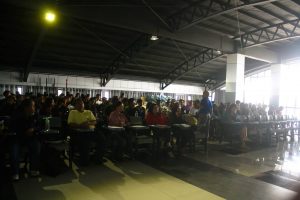The Research and Development Center organized a seminar entitled Orientation cum Seminar on the Conduct of Indigenous People Related Researches. It was held at the RCB Dome of the University last April 2, 2016. It was attended by students, faculty members and 2 deans. A total of 93 students from the School of Criminal Justice and Public Safety, School of Nursing and School of Liberal Arts and Human Sciences and 26 faculty members were present during the seminar. Mr. Michael G. Umaming, Development Management Officer V (DMO V) of National Council of Indigenous Peoples or NCIP- CAR, was the speaker.
Thought-provoking and inspiring historical background of the involvement of indigenous peoples in research was discussed as a kick-off topic for the seminar. The speaker discussed also the Indigenous Peoples Rights Act or IPRA which aims to recognize, protect and promote the rights of indigenous culture and indigenous cultural communities. IPRA’s 4-Fold Rights, the Right to Ancestral Domain Lands, Right to Self-Governance & Empowerment, Social Justice and Human Rights and Cultural Integrity were mentioned.
a kick-off topic for the seminar. The speaker discussed also the Indigenous Peoples Rights Act or IPRA which aims to recognize, protect and promote the rights of indigenous culture and indigenous cultural communities. IPRA’s 4-Fold Rights, the Right to Ancestral Domain Lands, Right to Self-Governance & Empowerment, Social Justice and Human Rights and Cultural Integrity were mentioned.
On research- related issues, Mr. Umaming focused on the following details: community initiated or solicited researches, academic researches, researches in aid of policy and social researches. The law, RA 8371, that governs Indigenous Peoples was briefly discussed. Free and Prior Informed Consent (FPIC) is needed whenever a research will involve indigenous peoples. The FPIC is a process by which the consent of the Indigenous Peoples (IPs) and the Indigenous Cultural Community (ICCs) shall be freely and voluntarily secured for a proposed project, plan of activities or undertaking in their ancestral domain or where indigenous peoples will be affected. FPIC’s operating principles and processes involve the following: self-determination, ownership and custody, (knowledge-holders/living masters) of IKSPs; IKSPs as sui generis; Free and Prior Informed Consent (FPIC); Equitable sharing of benefits; Protection of Community Intellectual Rights, Cultural Resources/Treasures and Traditional Cultural Expressions; Diversity and Uniqueness of the Culture of ICCs/IPs; Participatory and Culture Sensitivity.
The speaker answered queries during and after his talk. Most questions were drawn from the processes that were needed, the fees, and the involvement of NCIP in the region.
According to a student participant, “the discussion was informative and there were insightful ideas related to the ethical conduct of research”. | EEV @ RDC
